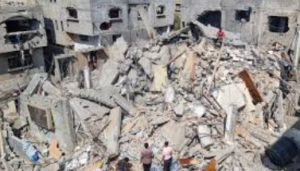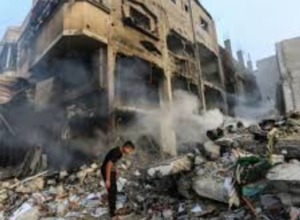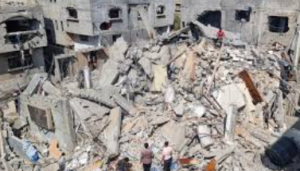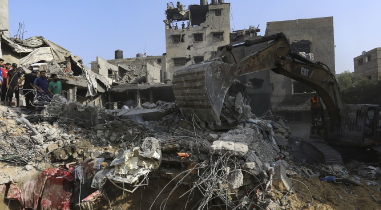- Meta Description: Israel launches a ground assault on Deir el-Balah in Gaza, intensifying the conflict and deepening the humanitarian crisis. Explore the latest developments and the impact on civilians.
Byline: Zaheena Rasheed, Umut Uras, and Nils Adler | August 19, 2024
Introduction
In the latest escalation of the ongoing conflict, Israeli forces have launched a ground assault on the central Gaza town of Deir el-Balah. This marks a significant shift in the conflict as Deir el-Balah, which had previously been spared from the worst of the fighting, is now under intense military pressure. The assault has forced a large number of Palestinians into the remaining 11 percent of the Gaza Strip that is not yet engulfed in fighting.
Key Developments:
- Ground Assault on Deir el-Balah: Israeli military officials confirmed that their soldiers are now operating in Deir el-Balah. The town, located in the central part of Gaza, had until now largely avoided the heavy ground battles seen in other areas such as Khan Younis and Rafah in the south. This new offensive has intensified the humanitarian crisis, with thousands of Palestinians displaced from their homes.
- Palestinian Journalist Wounded: Amid the escalating violence, a Palestinian journalist covering the ground invasion in Khan Younis was shot and wounded by Israeli forces. The journalist, who was reportedly struck in the back, is among several media workers who have been injured or killed during the conflict, raising serious concerns about the safety of those reporting from the ground.
- Hezbollah’s Retaliatory Attack: In a significant development, Hezbollah claimed responsibility for an artillery strike on Israeli troops stationed in the Zarit settlement in northern Israel. The group stated that the attack was in retaliation for Israeli airstrikes on southern Lebanese villages. This exchange of fire between Israel and Hezbollah highlights the risk of the conflict spilling over into a broader regional war.

Humanitarian Crisis:
The humanitarian situation in Gaza continues to deteriorate rapidly. The United Nations Office for the Coordination of Humanitarian Affairs (OCHA) has expressed grave concern over the escalating violence against aid workers. Acting UN humanitarian chief Joyce Msuya condemned the increasing “normalization of violence against aid workers,” particularly in Gaza, where over 280 aid workers have been killed since the conflict began in October 2023. This includes 163 deaths during the first three months of the war, largely due to Israeli airstrikes.
One of the most tragic incidents involved the death of seven aid workers from World Central Kitchen (WCK) in April, who were killed in an Israeli airstrike. The loss of these workers has severely impacted humanitarian efforts in Gaza, where the need for aid is more critical than ever.
International Response:
The international community has been watching the situation closely, with many countries and organizations calling for an immediate ceasefire. However, diplomatic efforts have so far failed to bring about a resolution to the conflict. The ongoing exchanges between Israel and Hezbollah, coupled with the intensification of ground operations in Gaza, suggest that the conflict may escalate further before any de-escalation occurs.
As the Israeli military intensifies its operations in Gaza, particularly in areas like Deir el-Balah, the humanitarian crisis deepens, with civilians bearing the brunt of the violence. The wounding of journalists and the continued targeting of aid workers underscore the dangers facing those trying to document and mitigate the conflict. With no clear end in sight, the situation in Gaza remains dire, and the risk of the conflict expanding into a broader regional war is ever-present.

Casualty Figures: As of August 2024, thousands of Palestinians have been killed or wounded in the conflict, with many more displaced. The exact numbers are difficult to verify due to the chaotic conditions on the ground.
Humanitarian Aid: Humanitarian agencies are struggling to provide essential services amid ongoing airstrikes and ground assaults. Access to food, water, and medical supplies is severely limited, exacerbating the suffering of Gaza’s civilian population.
- Global Reactions: International bodies such as the United Nations and the European Union have repeatedly called for an end to hostilities, urging both sides to engage in peace talks. However, these calls have yet to result in any tangible progress towards a ceasefire.






